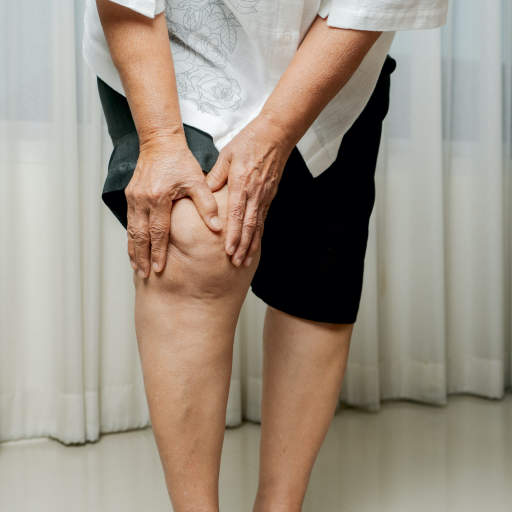The Challenge: Obesity Increases Inflammation
Low-grade systemic inflammation is already prevalent in people with psoriasis, and having obesity—or a body mass index (BMI) of 30 to 34.9—adds more inflammation, which can exacerbate psoriatic lesions, says Dr. Pooja Sodha, M.D., a board-certified dermatologist based in Washington, D.C. The daily low-grade inflammation associated with obesity can also put you at a higher risk for developing psoriatic arthritis, especially if you already have psoriasis.

Your Intake of Inflammatory Foods
Foods and bevs that are high in sugar can spark inflammation in the body, so do your best to save sweet treats and alcohol for special occasions. Speaking of alcohol: Dr. Sodha highly recommends avoiding it. “You definitely want to minimize your alcohol intake as it can induce immune dysfunction, which can worsen psoriasis—plus it causes weight gain,” she says. If you’re someone who’s accustomed to drinking fairly often, try experimenting with making fun mocktails, as there are so many delicious and refreshingly alcohol-free recipes out there that are also low on sugar.
The Challenge: Being Overweight Puts You at Risk for Other Ailments
Obesity is also associated with diabetes, hypertension, and hyperlipidemia; not coincidentally, having psoriasis also puts you at risk for these cardiovascular challenges. That being said, if you have psoriasis and want to lower your chances of acquiring one of these diseases, it’s definitely in your best interest to maintain a healthy weight if you’re able to. After all, the last thing you want to deal with is another medical condition that affects your quality of life.
Your Rx: Count Your Calories (in Moderation)
Tracking your calorie intake can be a helpful weight-loss technique for people with psoriasis, as it allows you to see what’s working (and what’s not) for your body. “If you can mentally handle it, try counting your calories,” says Dr. Joshua Zeichner, M.D., a board-certified dermatologist based in New York City. “If you take in less calories than you burn off, the weight will come off and your symptoms can improve.” Apps like Noom can help you set (and stick to) daily calorie goals.

The Challenge: Being Overweight Can Lead to Inverse Psoriasis
People with psoriasis who are overweight or obese may experience heightened discomfort in areas of the body where we have skin folds, such as under the breasts and in the groin area, due to the constant friction. Being overweight actually puts you at risk for inverse psoriasis—a form of the disease characterized by red, shiny lesions that appear in the skin folds. Having symptoms in these sensitive areas can be especially debilitating because of the continual friction, which makes it more difficult to manage and treat.
Your Rx: Sleep More and Minimize Stress
This one is a biggie. “Lack of sleep and excessive stress encourages excessive calorie intake and reduces the ability to exercise, thereby leading to weight gain that can worsen your psoriatic symptoms,” Dr. Sodha says. So it’s extremely important to get adequate sleep and reduce stress as much as possible. Making meditation and breath-work part of your day can be very effective ways to get your stress down—and they don’t take long. To help with sleep, try shutting off all your screens an hour before bedtime to signal to your brain that it’s snooze time.
The Challenge: Carrying Extra Weight Can Impact Certain PsA Drugs
How rude, right? And yet, unfortunately true. Being obese can in fact make certain medicines, like biologics, less effective because they’re dose-dependent—meaning a certain amount of the medication is needed to reach clinical efficacy, and if someone is obese, it could be dangerous to give them the amount that they require to effectively treat their symptoms. This obviously isn’t good, especially for those with severe cases of psoriasis or psoriatic arthritis who could really benefit from biologic medications.
Your Rx: Implement a Daily Exercise Routine
No, it doesn’t have to be intense. In fact, it doesn’t even have to be a full half-hour, but when it comes down to it, the more you can get your body up and moving, the better. “Do whatever you can to get off the couch,” says Dr. Zeichner. “Whether it’s a walk in the neighbourhood or a game of tennis, exercise helps burn fat and build muscle, which can subsequently potentially improve your psoriasis symptoms.” In addition, Dr. Sodha says that when you combine a low-calorie diet with daily exercise, it’s almost a surefire way to achieve a healthy weight that you can maintain.

The Challenge: Extra Weight Puts Stress on Your Joints
According to Dr. Sodha, being heavier inherently puts more stress and pressure on your joints, which can lead to even more joint pain and discomfort, as well as the potential for injury and heightened inflammation during the healing process. As if that wasn’t enough, if you already have psoriatic arthritis and are overweight, it also increases your risk of developing osteoarthritis—a.k.a. the most common type of arthritis, which results from wear and tear.
Your Rx: Amp Your Nutrient Intake
In addition to reducing your intake of inflammatory foods, one of the best things you can do for your body is add more good into your diet. Think: nutrient-dense foods in all different colours of the rainbow. The more healthy vitamins, minerals, and antioxidants you can incorporate into your meals, the better. At the end of the day, if you eat more fruits, veggies, and good-for-you grains, and fewer fatty, sugary foods, you’ll be doing yourself—and your PSO or PsA—a big favour.

No comments:
Post a Comment